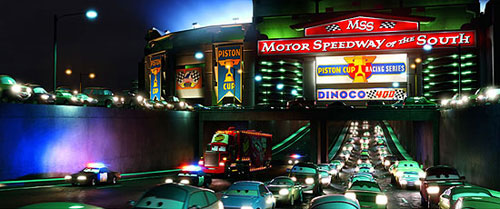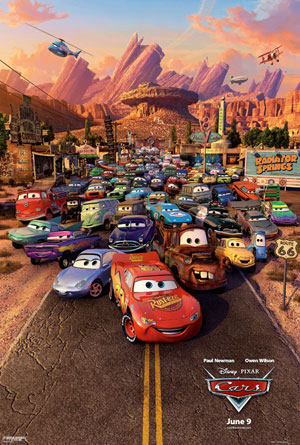 I get to Times Square about once a week. It isn’t by choice, but rather the nature of Manhattan’s screening rooms in relation to the subway. I had always assumed that Times Square, which during the last decade has morphed into the opening of Blade Runner, would be the place where I would see the most advertising condensed into one area. Then I visited the Loews Motor Speedway. It seems like everything is tagged with some sort of corporate sponsorship, and I narrowly avoided a disturbing incident in the urinal involving my privates and a potential sponsorship by Frito Lay.
I get to Times Square about once a week. It isn’t by choice, but rather the nature of Manhattan’s screening rooms in relation to the subway. I had always assumed that Times Square, which during the last decade has morphed into the opening of Blade Runner, would be the place where I would see the most advertising condensed into one area. Then I visited the Loews Motor Speedway. It seems like everything is tagged with some sort of corporate sponsorship, and I narrowly avoided a disturbing incident in the urinal involving my privates and a potential sponsorship by Frito Lay.
Richard Petty is almost one of those brands. In Pixar’s Cars he plays The King, and that essentially sums him up in terms of NASCAR racing. He’s among the sport’s most winningest drivers, and his popularity has been enduring. He raced his last race in 1992 but still maintains a team, as well as an endorsement empire.
Meeting Petty was a treat just because he’s one of those guys you never expect to be shaking hands with. I didn’t know much about racing before this junket (not that I do now. Hell, I don’t even have a license), but for some reason I had expected drivers to be short, like jockeys. Petty’s a tall man, with huge, powerful hands. He came into our room wearing his trademark shades and cowboy hat, with an easygoing nature. His answer to the first question was terse, but he soon opened up.
By the way, I like to give credit where credit is due, and the credit for this particular interview goes to many of the local journalists, who knew more about Petty and racing. I’m mostly acting as their transcriber here.
Q: What was the first car you ever owned?
Petty: The first car I ever owned was a 56 Dodge. My dad had raced it and we took it and made a road car out of it. That was the first car I ever had.
Q: What was one piece of advice you gave to Pixar about the psychology of racing?
Petty: I didn’t get involved in any of the storyline or anything. When John Lasseter called he asked if I would be interested in doing any voice overs. I said, what are we working on here? He gave me the storyline – he roughed it in, didn’t get anything particular – of what he was trying to do with the movie. I said OK, sounds good. We was racing in Sonoma and we stopped by on a Thursday I guess and did some voice-overs. What he did with the voice-overs was he sort of led me into what the character was supposed to be doing. I said 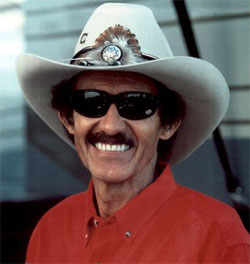 my lines two or three times and then they made the cars do like what I was talking while we was there. My wife, Linda, went with me and she and John got to talking about the good old days when we used to come to the racetracks with all the kids, and she would come in a station wagon and open up the back and fix sandwiches for everybody, all this kind of stuff. He asked her, ‘You want to be in the movie?’ She asked, ‘What can I do?’ So he went over and wrote out one or two little lines, and now she’s in the movie. She’s a station wagon. [laughs] He’s so sharp at playing it all, and he’s so good.
my lines two or three times and then they made the cars do like what I was talking while we was there. My wife, Linda, went with me and she and John got to talking about the good old days when we used to come to the racetracks with all the kids, and she would come in a station wagon and open up the back and fix sandwiches for everybody, all this kind of stuff. He asked her, ‘You want to be in the movie?’ She asked, ‘What can I do?’ So he went over and wrote out one or two little lines, and now she’s in the movie. She’s a station wagon. [laughs] He’s so sharp at playing it all, and he’s so good.
The storyline stuff was great, but if you’re a racer and you’ve been in racing – and John knows a lot about racing, he’s been to Cup racing, knew a lot of the people, knew a lot of the track owners and stuff like that. He knew enough about the history to bring a lot of the history in, and what he didn’t know he went out and asked people and found out. If you’re a real racer and you watch the movie then you see different incidents along the movie that the average guy’s not really going to understand the storyline of why it was in there. But if you’re a real racer you’ll understand what he’s talking about.
One of the scenes for instance has Mario Andretti – he’s not a stock car driver, but he won a race at Daytona, so he brings him through there. The average guy’s just, ‘What’s he doing there?’ Things like that which were very truthful. So he took the truth and put the Hollywood in it and put his deal in it.
Q: What do you think this movie is going to do for NASCAR? Could this be an area where you capture kids for the sport?
Petty: I don’t know. I don’t know how much this will bring from the movie back to the race fan. The race fan’s going to eat it up, but if you don’t know anything about racing but you just like cars and you go to the movies to see it, I don’t know if it’ll make you a stock car fan. It might make you get your curiosity up, but I don’t see it going as much that way as the racing fan seeing the show deal. For general populace, it’s not a bad selling point for our deal, but I don’t know if it’s a big selling point. The kids and the grown people too just see cars, I don’t know if they’re going to recognize them as stock cars or anything – so much of the movie’s not even about the racing part of it. The gist of the movie’s in the middle with the racing at the beginning and the racing at the end. The middle is just a Middle America deal, an everyday life deal that doesn’t even talk about racing.
Q: Did you suggest the Superbird body for your car?
Petty: No, they had that all figured out when they called me. They had the Petty blue, the number, the Superbird. John knew my history as far as us winning a bunch of championships. And basically, the last race I ran in life I crashed, so that’s in the movie. As I say, the racing people will see that.
Q: Has Hollywood ever approached you before about a movie?
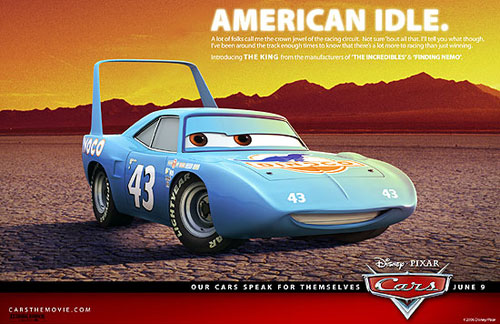
Petty: Disney was working on putting a movie together about the Petty family, they’ve been working on it for a couple of years. They’ve had four or five different storylines but they’ve never had nothing they’ve settled on. It’s just like this movie – if it didn’t have a good plot, you can’t make a good movie. If they’re going to make a movie about racing or the Petty crowd, you need a good story plot instead of just racing. You got to have some kind of storyline, and so far they do not have that.
Q: Why do you think NASCAR is so big now – it’s second to the NFL in popularity in the United States.
Petty: How did you get here? You drove. Everybody whether they know it or think it got a love affair with a car. Everybody gets places and does things with cars, and so in doing that everybody’s curious about what their cars are doing.
The big deal, I think is that racing for a long period of time was just racing. It’s got to be showtime now like football or baseball or basketball – we’re competing against a lot of different things, and football and baseball have been there so long you’ve got a crowd of people in the country looking for something different. I think stock car fits in that category because we’re getting in our demographics more and more of your younger people looking for new things. They’re looking for new things and racing fits in that schedule right now.
Racing’s different now to the true race fan, and there’s a lot they don’t like, but with a new crowd of people coming in, that’s what they get, that’s what they accept, and they’re OK with it. NASCAR more and more – they had the All Star the other night and they race a little bit and have a concert. It’s show business. Our racing’s not as bad as the All Star, but they’ll have different things going on in here, entertainment before the big show goes on.
Q: If you could change anything about NASCAR now, what would it be?
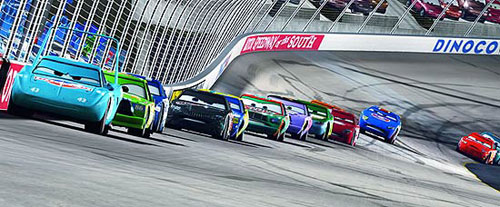
Petty: I’d win more races. [laughs]
I don’t know. It’s a real hard question because it’s so complicated – if you say NASCAR you’re talking about the cars, you’re talking about the track, you’re talking about the way they run their business. The basic deal, if you look at how NASCAR started in 1949 – in fact they started on the other side of town, where the first NASCAR Cup was run – they graduated to where they are now and they’ve not done a whole lot wrong. They’ve chipped away a little bit at a time. They know they’re not a National Football League; all they want to do is be as close to that as they can. They know they’ll never get there, but that don’t keep them from trying. We’re number two and trying harder than number one.
Q: Is there anything from the old days that isn’t in the new NASCAR that you miss?
Petty: I miss the pure racing part of it. to go back to the show business part of it, the way that NASCAR runs their operations now, they want more entertainment out of the race. A good racer, he’s not worried about putting on a show – all he wants to do is race and win. If he can be ten miles ahead, he wants to be ten miles ahead. NASCAR won’t let him. They control it enough that they won’t let anybody get ten miles ahead. That part I don’t like that much.
Q: The film is a story about a rookie who gets lost in the glamour and the glitz. Do you see that with the young drivers today?
Petty: Yeah. What you do is you wind up with somebody who’s been running and doing good on a Saturday night in local deals. You go to those racetracks and they 1500 or 2000 people – all of a sudden you’re in a deal where they’ve got 150 or 200,000 people. You’re in the limelight overnight. A lot of times it’s hard to make that adjustment. A kid out of high school going into college or out of college going pro, all of a sudden he’s making 10 million bucks – he goes into a different world. A lot of times it’s hard for them to adapt.
Q: Do you give any advice to these younger drivers?
Petty: Well, you try to. If they ask you give it to them, but sometimes you give it to them without them asking. [laughs] What you are is what you are, so don’t try to make something else out of it. The majority of the boys do – you get real far out and your sponsor or your car owner or NASCAR says, ‘Whoa, you’re out there.’ They got these guys going to anger management! [laughs] I mean, really. Also when the drivers come in the sponsors send them to Dale Carnegie courses and all this stuff to get them oriented to what they really are facing, because it’s a new world to them.
